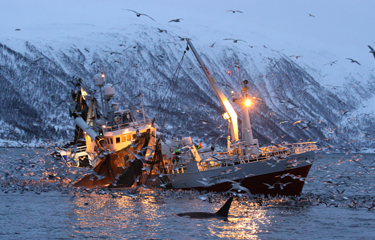The Marine Stewardship Council has announced that it is suspending the certifications of the Atlanto-Scandian herring and blue whiting fisheries as of 30 December, 2020.
The MSC had been warning for months that the Atlanto-Scandian herring and blue whiting fisheries were at a high risk of losing MSC certificates. The fisheries were in danger because the quotas for the species were set above the recommended level by the International Council for the Exploration of the Seas.
The Atlanto-Scandian herring fisheries to be suspended are: ISF Norwegian and Icelandic herring trawl and seine (Iceland); SPSG, DPPO, PDFA, SPFPO, and KFO Atlanto-Scandian purse-seine and pelagic trawl herring (E.U. and United Kingdom); Faroese pelagic organization Atlanto-Scandian herring (Faroe); and Norway spring spawning herring (Norway).
The blue whiting fisheries that will be suspended are: Norway North East Atlantic blue whiting; PFA, DPPO, KFO, SPSG, and Compagnie des Pêches St Malo Northeast Atlantic blue whiting Pelagic Trawl; Faroese Pelagic Organization North East Atlantic blue whiting; and the ISF Iceland North East Atlantic blue whiting.
“We urge nations to commit to a quota-sharing agreement in line with the scientific advice,” MSC Northern Europe Director Erin Priddle said. “Only through effective stock management can we ensure the health of the herring and blue whiting stocks in the short-, medium-, and long-term.”
The crux of the suspension stems from a lack of international effort in setting the quota low enough that the scientific advice isn’t exceeded. The quota-sharing agreement between the European Union, United Kingdom, Iceland, Faroe Islands, Norway, Russia, and Greenland resulted in a quota that was higher than the scientific advice. Typically, the fishery lands between 600,000 and 700,000 metric tons (MT) of herring annually. Collectively in 2019, the fisheries caught 777,165 MT – 32 percent more than the scientific advice for the year.
“While individual fisheries often make great efforts to improve their sustainability, ultimately, they cannot do it alone,” Priddle said. “Migratory species like Atlanto-Scandian herring do not observe national boundaries, so we need international agreements to manage whole ecosystems in an adaptive, scientific way, rather than managing fish resources based on national interest.”
The suspension is for the same reason that the MSC suspended the mackerel fisheries in the Northeast Atlantic in 2019, a suspension that still stands due to ongoing concerns about the management of the species.
With the suspension of blue whiting and Atlanto-Scandian herring, a large source of MSC-certified feed for salmon farms goes with it. The landings of both species are, according to the MSC, predominantly used to produce fishmeal for farmed salmon, with only small quantities sold as surimi to consumers in Japan, Australia, and France.
Photo courtesy of Alessandro De Maddalena/Shutterstock







